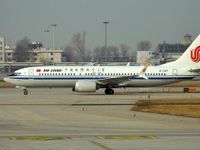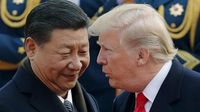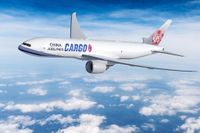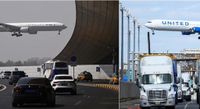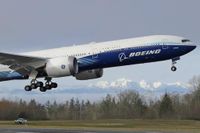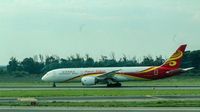In a significant escalation of the ongoing trade war between the United States and China, Beijing has ordered its airlines to halt all deliveries of Boeing aircraft. This directive, which affects major carriers such as Air China, China Eastern, and China Southern, comes in response to the hefty tariffs imposed by former President Donald Trump, which have reached as high as 145% on Chinese imports. In retaliation, China has announced its own set of retaliatory tariffs, including a 125% levy on American goods, further complicating the already tense trade relations.
According to sources reported by Bloomberg, the Chinese government has instructed its airlines to not only suspend the acceptance of new Boeing jets but also to cease all purchases of aerospace equipment and components from U.S. manufacturers. This decision is rooted in the skyrocketing costs associated with U.S.-made aircraft, which have more than doubled due to the tariffs, making it financially unfeasible for Chinese airlines to accept new deliveries.
China had approximately 179 Boeing aircraft scheduled for delivery between 2025 and 2027, including 81 for China Southern Airlines, 53 for China Eastern, and 45 for Air China. However, these planes are now caught in a bureaucratic limbo, with the potential for some that have already completed the necessary paperwork to still be allowed into Chinese airspace. Nevertheless, this blockade presents a substantial setback for Boeing as it attempts to regain its footing in the market after a series of setbacks, including safety concerns and production delays.
Ryanair, the European low-cost airline, is also feeling the impact of these developments. CEO Michael O’Leary has indicated that if the costs of the Boeing 737 Max aircraft rise due to tariffs, the airline may delay its planned deliveries. Ryanair is set to receive 25 new Boeing jets starting in August 2025, but O’Leary has stated that he does not require these aircraft until March or April 2026. This gives the airline some leverage to negotiate or delay deliveries until the situation stabilizes.
Experts warn that the halt in deliveries could have dire consequences for the safety and operational efficiency of Chinese airlines. The suspension of new aircraft deliveries, coupled with the restriction on acquiring spare parts from U.S. suppliers, could lead to increased operational costs and potential safety risks. As one expert noted, "If the arrival of a plane is part of a long-planned action, no one knows when a specific component may be needed after a minor incident or malfunction." This uncertainty could compel airlines to seek assistance from the Chinese government or develop an internal supply chain for maintenance and repairs.
The implications of this trade conflict extend beyond the immediate concerns for Boeing and Chinese airlines. The Chinese market represents about 20% of global aircraft demand over the next two decades, and losing access to this market could severely hinder Boeing's recovery efforts. The company has long relied on the Chinese market, which accounted for about 25% of its production in 2018. However, with no significant new orders from China in recent years, the stakes are higher than ever.
In response to the trade tensions, China is accelerating the development of its domestic aircraft manufacturing capabilities. The Commercial Aircraft Corporation of China (COMAC) is ramping up production of its C919 aircraft, aiming to produce between 30 and 50 units in 2025, with plans to increase capacity to 150 aircraft annually by 2029. The C919 is designed to compete directly with Boeing's 737 and Airbus's A320, and its increasing presence in the market could pose a serious challenge to both Western manufacturers.
Furthermore, the Chinese government is exploring ways to support airlines that lease Boeing aircraft and are now facing higher operational costs due to the trade war. This assistance could take various forms, including financial aid or incentives to transition to domestic aircraft.
The situation is further complicated by the fact that Boeing employs tens of thousands of workers in the United States, particularly in Washington, Missouri, and South Carolina. A significant drop in demand from China could lead to layoffs, production cuts, and a ripple effect throughout the U.S. manufacturing sector, which relies on Boeing for jobs and economic stability. The aerospace giant also depends on global suppliers, including those in China, for various components, meaning that the trade war could disrupt its entire supply chain.
As the trade war intensifies, the repercussions for both the U.S. and Chinese economies are becoming increasingly apparent. Analysts predict that the standoff could lead to a significant downturn in the aerospace sector, affecting not only Boeing's operations but also the broader economic landscape. With the stakes so high, both nations are under pressure to find a resolution that can restore stability to their trade relations.
In summary, the recent developments in the Boeing-China saga highlight the complexities of international trade and the far-reaching consequences of tariff wars. As both sides navigate this challenging landscape, the future of the aerospace industry hangs in the balance, with potential implications for global supply chains, employment, and the overall economy.
